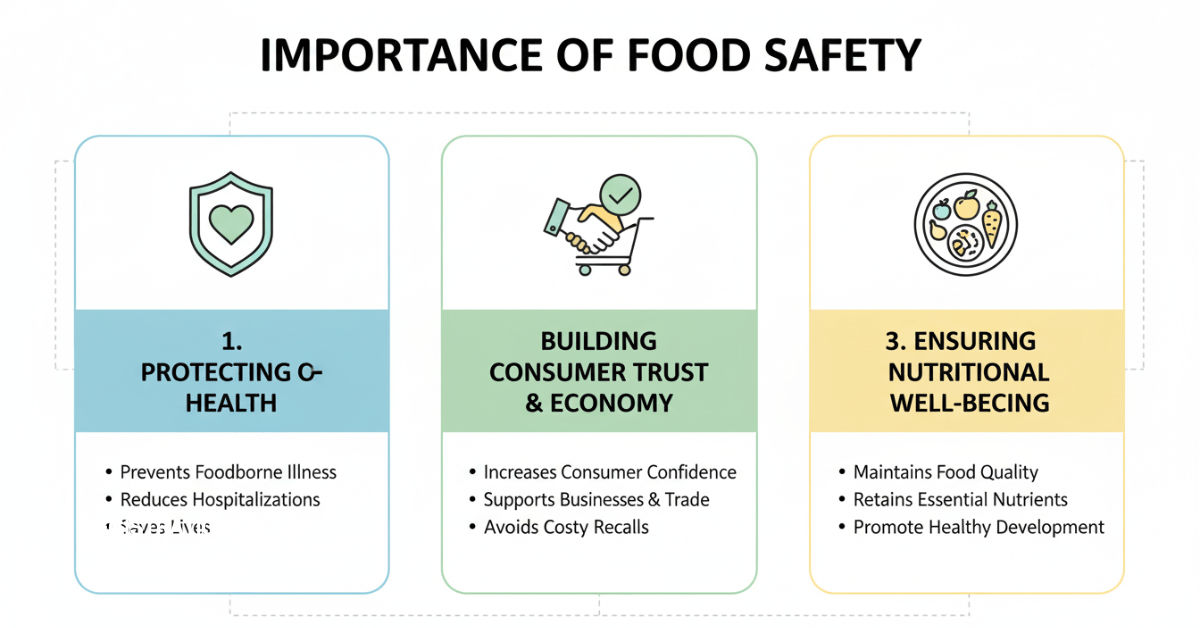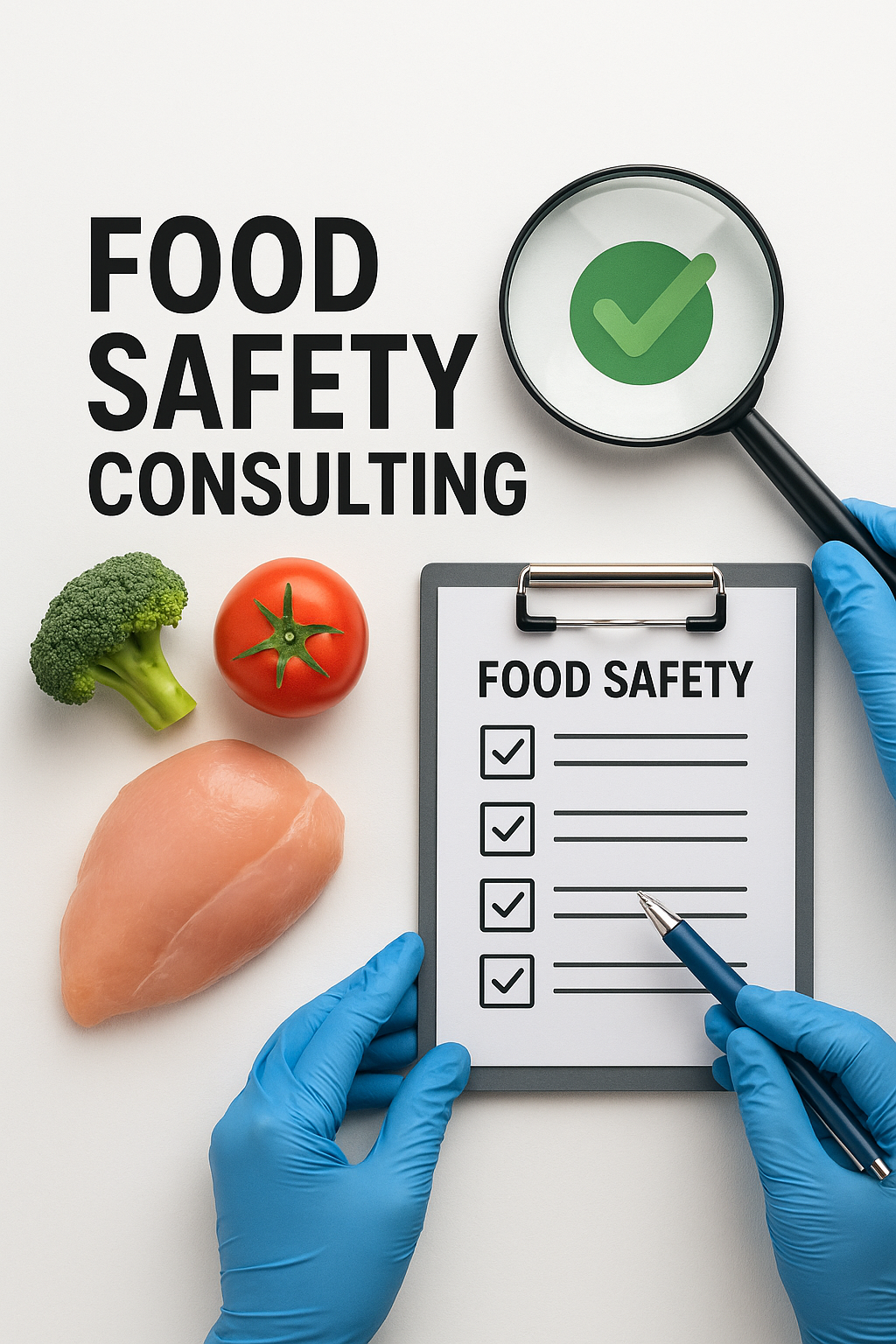
Every meal we eat begins with a promise: that the food on our plate is safe. Behind that simple expectation lies a complex system of checks, regulations, and responsibilities that ensure what reaches consumers is free from contamination and risk.
Food safety is not just about avoiding illness; it is about protecting communities, building trust, and keeping industries accountable.
For businesses, especially those in the food and related sectors, prioritizing safety is essential. It strengthens compliance with regulations, safeguards reputation, and supports sustainable growth in an increasingly global market.
Understanding the importance of food safety helps organizations recognize that it is more than a requirement it is a commitment to people’s well-being and long-term business resilience.
At the heart of food safety is the protection of human health. Contaminated or poorly handled food can lead to foodborne illnesses, which affect millions globally each year. These illnesses range from mild stomach discomfort to severe medical conditions, sometimes even resulting in death.
When businesses enforce proper hygiene practices, ensure correct storage conditions, and maintain strict production protocols, they directly lower the risk of outbreaks. Protecting public health is not only a moral responsibility but also a way to strengthen trust in the wider food system.
Governments around the world set detailed standards to ensure food safety. Regulations such as Good Manufacturing Practices (GMP), Hazard Analysis and Critical Control Points (HACCP), and for exporters, EU-GMP, outline strict protocols that businesses must follow.
Companies that fail to comply face serious consequences, including fines, license suspensions, or complete closure of operations. By adhering to regulatory requirements, businesses demonstrate responsibility, avoid costly penalties, and create smoother pathways for inspections and certifications. For many organizations, working with compliance consultants helps simplify this process and maintain readiness.
Food safety directly shapes how consumers view a brand. Shoppers want reassurance that what they buy is produced responsibly and meets safety standards. A company that consistently delivers safe, high-quality products builds credibility over time.
Transparent labeling, certification marks, and clear communication about safety processes can strengthen this trust. When consumers feel confident in a brand, they return for repeat purchases and even recommend it to others. In competitive industries, trust becomes a defining advantage.
Food recalls are among the costliest events a business can face. They not only involve financial losses but also create lasting damage to reputation. Most recalls occur due to contamination, improper labeling, or lapses in production oversight.
Preventive measures reduce these risks significantly. Examples include:
By embedding these practices, businesses protect themselves from the disruption and reputational harm caused by recalls.
Reputation in the food industry is built over years but can be damaged in a single incident. With information spreading quickly online, one safety issue can dominate headlines and social media, leaving companies struggling to recover.
On the other hand, brands that consistently demonstrate strong food safety standards earn respect not only from consumers but also from regulators and industry peers. A strong reputation for safety becomes a business asset, reinforcing credibility in both local and international markets.
Food production often involves multiple steps and players: farmers, processors, distributors, and retailers. Each stage carries risks if not managed carefully. A single weak link in the supply chain can compromise the safety of an entire product line.
Businesses that implement thorough supply chain monitoring such as supplier audits, raw material testing, and certifications, create stronger controls. By holding every partner accountable, they minimize risks and ensure the final product reaching consumers maintains high standards of safety.
Consumers expect consistency. Whether it’s taste, texture, or freshness, customers rely on businesses to deliver the same quality every time. Food safety systems are closely tied to achieving this consistency.
Standard operating procedures, routine inspections, and adherence to safety guidelines ensure that every product meets set expectations. Reliable quality not only satisfies customers but also reduces complaints and waste. Over time, consistent quality builds consumer loyalty.
For businesses aiming to expand globally, food safety becomes even more critical. International markets impose strict requirements before allowing imports. Certifications like EU-GMP or HACCP are often mandatory.
Companies that achieve these standards open doors to new markets and partnerships. Compliance with international benchmarks signals that a business is reliable, responsible, and prepared to meet the demands of cross-border trade. This expands opportunities for growth while strengthening industry reputation.
Unsafe food products can lead to lawsuits, compensation claims, and insurance disputes. Legal battles drain financial resources and damage business stability.
By maintaining thorough documentation of safety checks, conducting training, and demonstrating adherence to regulations, businesses reduce these risks. Being able to show clear due diligence in safety practices also helps companies defend themselves if legal challenges arise. This proactive approach protects both the organization and its stakeholders.
Food safety contributes to sustainability in multiple ways. Safe practices often overlap with sustainable ones, such as responsible sourcing, careful waste management, and efficient resource use. By aligning safety and sustainability, companies create systems that protect people and the environment.
Beyond compliance, businesses that commit to long-term food safety practices show responsibility to communities and future generations. This positions them as ethical organizations with a vision that extends beyond profits.

Achieving consistent food safety is a complex process that requires specialized knowledge. Regulations evolve, standards differ across regions, and businesses must constantly adapt to remain compliant. Many organizations, especially in sectors like food, pharmaceuticals, and natural health, partner with compliance and quality assurance experts for guidance.
At MFLRC, we provide tailored support for businesses navigating GMP, EU-GMP, and other regulatory frameworks. Our expertise helps companies establish solid food safety systems, prepare for audits, and build practices that align with industry best standards. By taking a proactive approach, businesses can protect consumers, meet regulations, and position themselves for sustainable growth.
Food safety is more than an industry requirement it is a commitment that affects health, trust, and the long-term future of businesses. From preventing illness to supporting international trade, its importance spans across every stage of production and every level of the market.
Companies that prioritize food safety not only protect their customers but also strengthen their own position in competitive industries. By working with regulatory and quality assurance experts, businesses can confidently meet standards, reduce risks, and build a legacy of reliability.
Safe food is not just good business it is the foundation of trust between industries and the communities they serve.
| Disclaimer |
| The above blog post is provided for informational purposes only and has not been tailored to your specific circumstances. This blog post does not constitute legal advice or other professional advice and may not be relied upon as such. |

MFLRC is a one-stop shop for all of your Licensing, quality assurance and compliance needs. Our team has years of experience in the cannabis industry and are experts in all facets. We offer a variety of services that will save you time and money. Let us take the burden off your shoulders so you can focus on what’s important – growing your business.
Contact us Now!
Mussarat Fatima, President, and owner of MF Cannabis License and Regulatory Consultants has more than twenty years of experience in Quality Assurance, Quality Control, and Regulatory Affairs within the pharmaceutical, Food and Cannabis industries. She has a Master’s Degree in Food Sciences and Biochemistry; in addition to this, she also has a diploma in pharmaceutical Quality Assurance, Regulatory Affairs, and Quality Control. Also, she has completed several certifications specifically in Cannabis Quality Assurance, Regulatory Affairs, and Facility management from recognized institutes in Canada.

Written By: Mussarat Fatima
President at MF License & Regulatory Consultants
Website: https://mflrc.com/
Contact: info@mflrc.com